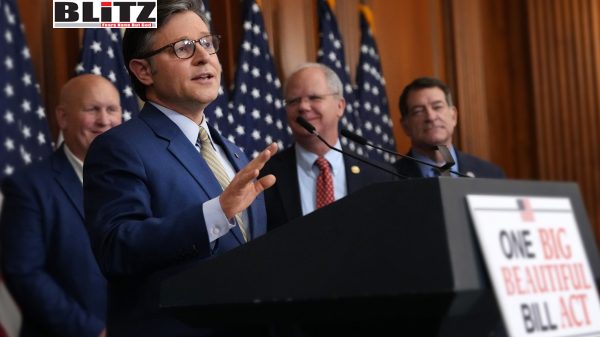Trump’s ‘big beautiful bill’ passes US House despite GOP divisions and debt concerns
- Update Time : Saturday, July 5, 2025

On the eve of Independence Day 2025, the US House of Representatives narrowly passed a landmark multitrillion-dollar tax and spending package, hailed by President Donald Trump as “big, beautiful bill.” The 887-page legislation, approved by a tight 218-214 vote, marks the most significant legislative achievement for Republicans since they regained full control of Congress and the White House earlier this year.
The bill’s passage followed a tense 24-hour period of negotiations and political pressure, as Republican leaders, including Speaker Mike Johnson and the Trump White House, worked feverishly to secure votes from hesitant GOP members. Only two Republicans-Representatives Thomas Massie of Kentucky and Brian Fitzpatrick of Pennsylvania-defied party lines to vote against the package, underscoring the razor-thin margin and internal divisions within the Republican caucus.
Now headed to President Trump’s desk for a signature expected on July 4, the bill embodies the administration’s aggressive “America First” agenda, combining extensions of the 2017 Trump-era tax cuts with expansive new spending measures and significant policy shifts. President Trump publicly praised the bill and those responsible for shepherding it through Congress.
On July 4, Trump took to his social media platform, Truth Social, to commend Speaker Mike Johnson, writing, “Great job by the Speaker of the House, Mike Johnson, who spearheaded the drive in Congress for the approval of the ‘ONE BIG BEAUTIFUL BILL ACT.’ He has Great Strength and Wisdom, and will go down as one of the most successful Speakers of the House in History, maybe even the BEST OF THEM ALL. Thank you Mike, and congratulations on a job well done!”
Johnson, who played a pivotal role in uniting fractured Republican factions, echoed the president’s optimism in a joint statement with House GOP leaders: “Republicans in Congress have succeeded in our mission to enact President Trump’s America First agenda.”
At its core, the bill extends key provisions of Trump’s 2017 tax reform, which lowered rates for individuals and corporations. It also temporarily reduces taxes on tips and overtime pay, a measure aimed at benefiting working Americans in the service sector. These extensions are designed to cement the tax policies that Republicans say have stimulated economic growth and job creation during Trump’s tenure.
Alongside tax cuts, the legislation authorizes hundreds of billions of dollars in new federal spending, primarily directed toward military expansion and enforcement of immigration policies aligned with Trump’s hardline approach. The bill includes funding for what the administration describes as “mass deportation operations,” reflecting Trump’s commitment to aggressively tackling undocumented immigration.
To partially offset the increased spending and tax revenue losses, the bill imposes significant cuts on domestic social programs. Medicaid, the nation’s largest public health insurance program for low-income Americans, faces a staggering reduction of approximately $930 billion over the next decade. This is a controversial move, especially given Trump’s earlier promises to protect the program.
In addition to Medicaid, the legislation slashes funding for food assistance programs such as SNAP (Supplemental Nutrition Assistance Program) and trims subsidies for clean energy initiatives. These reductions have drawn sharp criticism from Democrats and advocacy groups, who argue that vulnerable populations will bear the brunt of the bill’s austerity measures.
The Congressional Budget Office (CBO) released a detailed assessment of the bill’s fiscal impact, which raised alarms about its long-term consequences. According to the CBO, the package will increase the national debt by $3.3 trillion over the next ten years. The bulk of this increase results from $4.5 trillion in revenue losses due to tax cuts, far outweighing the $1.2 trillion in spending reductions.
Moreover, the legislation raises the federal debt ceiling by $5 trillion, enabling the government to borrow more to finance its obligations but exacerbating concerns about fiscal sustainability.
Fiscal conservatives and some moderate Republicans expressed unease about the growing national debt, fearing it would constrain future government spending and economic stability. Representative Brian Fitzpatrick, one of the bill’s two Republican opponents, warned, “This bill is a fiscal time bomb. The long-term economic consequences will be devastating.”
The bill’s narrow passage belies the internal turmoil that rocked House Republicans in the days leading up to the vote. Initially, a group of GOP holdouts blocked a procedural vote on July 2, threatening to derail the entire package.
In response, Speaker Johnson and President Trump launched a concerted effort to win over reluctant lawmakers. Trump reportedly called multiple members personally in the early hours of July 3, urging them to support the bill. Vice President J.D. Vance also played a crucial role in rallying Republican votes, engaging in last-minute negotiations and offering concessions where possible.
Sources close to the negotiations said that many Republicans ultimately voted for the bill not out of enthusiasm but out of fear of Trump’s political backlash. With Trump maintaining enormous influence over the Republican base, lawmakers faced pressure to align with his agenda or risk primary challenges and public criticism.
Unsurprisingly, Democrats opposed the bill unanimously, condemning it as reckless fiscal policy that prioritizes tax breaks for the wealthy and corporate interests at the expense of working families and essential social services.
House Minority Leader Hakeem Jeffries denounced the legislation, stating, “This bill is a giveaway to the richest Americans and a slap in the face to those struggling to get by. Cutting Medicaid and food assistance while adding trillions to the debt is both irresponsible and immoral.”
Public opinion remains sharply divided. Polls suggest that while many Republican voters support the bill’s tax cuts and immigration enforcement, there is widespread concern about the cuts to healthcare and social welfare programs, especially among independents and Democrats.
With the bill now law, the Trump administration is poised to implement its ambitious agenda, including expanded military spending and immigration enforcement operations. However, the cuts to Medicaid and food programs may face legal challenges and pushback at state and local levels.
Economic experts caution that the increase in the national debt and the potential destabilizing effects of slashing social safety nets could complicate future policymaking and economic growth.
For Republicans, the bill’s passage cements their control of Washington and delivers a major political win. Yet, the narrow vote margin and internal dissent foreshadow challenges ahead, both in governing effectively and in navigating the political fallout from a deeply contentious piece of legislation.
As the country celebrates Independence Day, the “big, beautiful bill” stands as both a testament to Republican political strength and a harbinger of the fiscal and social debates to come.










